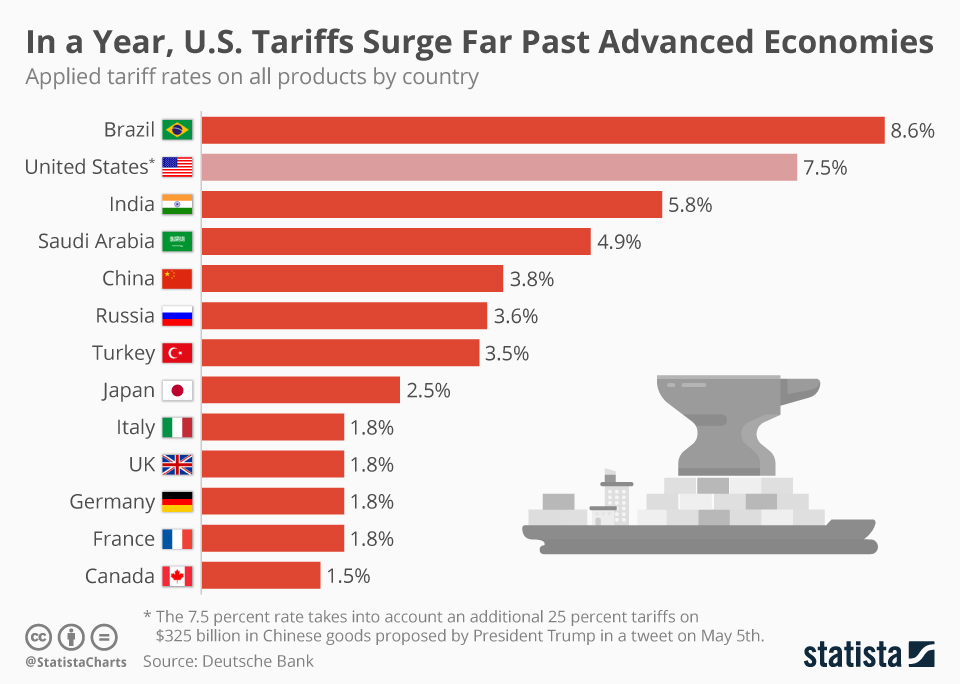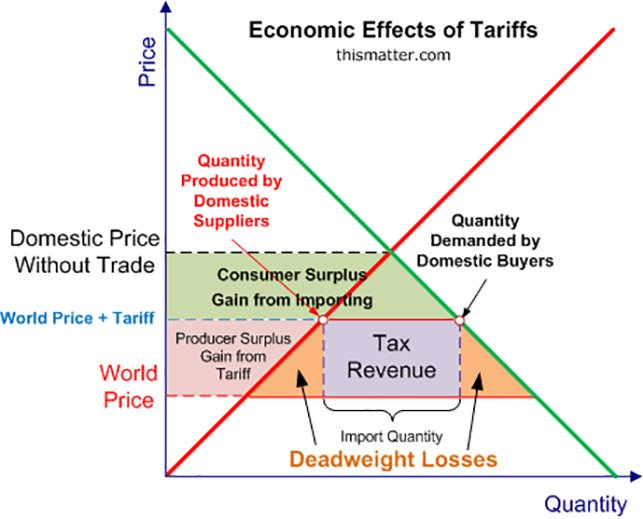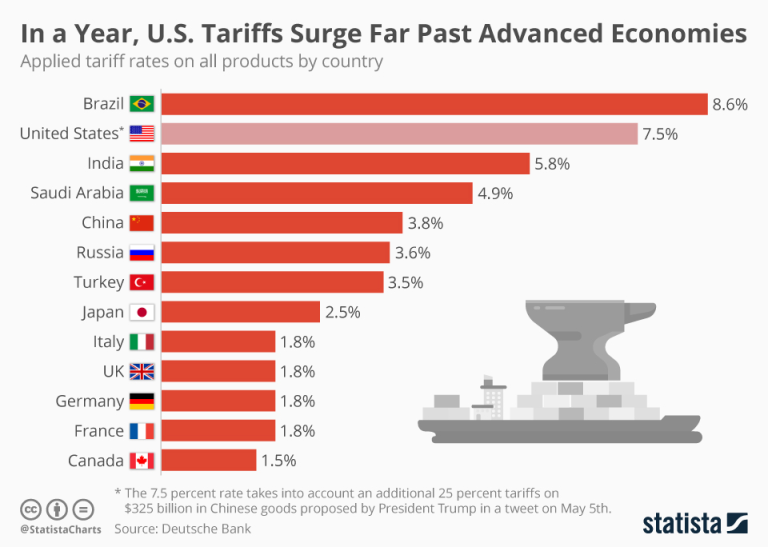
The complex interplay between tariffs and the U.S. economy is a focal point of ongoing debates about trade policy and its implications for American workers. Recent actions, such as those advocated by Senator Rick Scott, aim to reshape U.S. trade fundamentals, particularly as they relate to China trade relations. Scott argues that tariffs will ultimately level the playing field, making it easier for American workers to compete globally and potentially altering the narrative around tariff impact on inflation. However, economists have voiced concerns over how these tariffs could backfire, affecting both prices and economic stability. As U.S. trade policy continues to evolve, the role of tariffs remains a critical issue that influences everything from consumer spending to international diplomatic relations.
The discussion surrounding protective tariffs and their influence on the American economy draws attention to significant aspects of trade dynamics and labor markets. Under current strategies, led by figures like Senator Rick Scott, the focus is on implementing trade barriers that could bolster domestic industries and support American laborers. This approach seeks to confront major trading partners, particularly with regard to the competitive landscape posed by China and its far-reaching economic policies. While proponents claim such measures may yield positive outcomes for U.S. businesses, skeptics warn that the broader implications for inflation and international relations could be detrimental. As the U.S. navigates this intricate trade environment, the implications of these tariffs could resonate well beyond just economic metrics.
Understanding the Impact of Tariffs on the U.S. Economy
Tariffs, as advocated by figures like Sen. Rick Scott, are seen as tools to bolster the American economy by leveling competition with foreign nations. By imposing tariffs, particularly on imports from countries like China, Scott believes that U.S. workers will have a fair chance to sell their goods on an international stage. This perspective is rooted in the notion that reducing foreign competition through increased tariffs can help domestic manufacturers thrive, potentially leading to job growth and an enhancement of the U.S. economy as a whole.
However, the reality of tariffs is much more complicated. Economists like Jason Furman have pointed out that unilateral tariffs can lead to uncertainty in the market and may ultimately hurt American consumers through increased prices. The concern is that while tariffs aim to protect American jobs, they may inadvertently cause inflation, reversing the intended benefits. A clear understanding of these dynamics is essential for evaluating the long-term implications of such trade policies.
Rick Scott’s Stance on Trade Policies and American Workers
Sen. Rick Scott’s firm stance on implementing tariffs reflects his commitment to supporting American workers. He argues that by challenging foreign tariffs, particularly those of China, the U.S. can create a more equitable trading environment. Scott’s assertion that ‘the American worker will no longer be disadvantaged’ signals his belief that these measures will help U.S. manufacturers compete effectively on a global scale. His experience as the former governor of Florida informs his perspective on fostering a robust local manufacturing sector that can withstand international competition.
However, this protectionist approach has its critiques. Many experts argue that tariffs can harm the very workers they aim to protect, leading to retaliatory measures from other nations and increased costs for consumers. As Scott promotes tariffs as a method of aiding American workers, it raises essential questions about balancing support for local industries with the broader implications of U.S. trade policy on inflation and economic growth.
Tariffs and U.S. Trade Policy: A New Direction
The current attitude toward tariffs represents a significant shift in U.S. trade policy, particularly under the influence of the Trump administration, with Rick Scott as a vocal supporter. The implementation of a 10 percent tariff on many imports, along with a staggering 145 percent on Chinese goods, indicates a strategy aimed at reshaping how the U.S. engages in international trade. This shift reflects a desire to renegotiate the terms of trade, making it more favorable for American producers and signaling a tougher stance against long-standing trade disputes.
Nonetheless, altering trade policy through tariffs isn’t without its critics. Prominent economists warn that such aggressive moves could destabilize market relations, prompting countries like China to retaliate with their tariffs, as evidenced by China’s 125 percent tariffs on U.S. imports. This back-and-forth can lead to a trade war that may ultimately compromise the economic well-being of American consumers and businesses, highlighting the complexity of modern trade negotiations.
The Consequences of Tariffs on Inflation and Economic Growth
One of the most pressing concerns about the imposition of tariffs, as highlighted by Scott’s remarks, is their potential impact on inflation. Tariffs can lead to increased costs for imported goods, which often trickle down to consumers in the form of higher prices, thereby contributing to inflation. Scott’s uncertainty about how tariffs will affect inflation underscores the need for careful analysis and consideration of economic indicators before implementing such policies.
Furthermore, the relationship between tariffs, inflation, and overall economic health cannot be overlooked. While the intent behind tariffs may be to protect domestic jobs, the broader economic consequences could lead to stagnation or shrinkage in growth rates, as companies face higher costs and lowered consumer demand. Balancing the need for protective measures with sustainable economic strategies is essential for policymakers moving forward.
China Trade Relations: A Critical Perspective
Rick Scott’s views on China reflect a growing sentiment among some U.S. lawmakers regarding the challenges posed by the nation as a competitor on the global stage. By arguing for the elimination of trade agreements with China, Scott highlights the deep-seated concerns over economic and political influence that China wields. His assertion that reducing trade engagement could potentially prevent conflict emphasizes the strategic considerations influencing current U.S. trade policy.
Despite Scott’s perspective, a complete withdrawal from trade with China poses significant risks. Many experts warn that severing trade ties could lead to increased costs for American consumers and disrupt supply chains. The delicate balance between promoting national security and maintaining robust trade conditions requires comprehensive evaluation and alignment of U.S. trade strategies with economic realities.
Examining Rick Scott’s Economic Strategy
Rick Scott’s economic strategy is heavily influenced by his strong support for tariffs, which he believes will improve conditions for American workers and businesses. He positions tariffs as a necessary tool for leveling the playing field in global trade, aiming to secure advantages for U.S. manufacturers. By advocating for protective measures against countries with perceived unfair trade practices, Scott seeks to reinforce the resilience of the U.S. economy.
However, as the economic climate evolves, Scott must also consider the ramifications of his policies. The mixed responses from economists regarding the effectiveness of tariffs raise questions about long-term viability. It is crucial to analyze how Scott’s proposed strategies align with broader economic trends and the potential need for adaptive policies that promote both growth and stability.
Balancing Tariff Policies with Trade Negotiations
In discussions surrounding tariffs and trade policy, the importance of balancing aggressive tariff measures with diplomatic negotiations becomes a focal point. Sen. Rick Scott’s stance on imposing tariffs without engaging in comprehensive trade discussions raises questions about the efficacy of his approach. Critics like Jason Furman argue that exploring diplomatic channels may yield better results in addressing trade imbalances without triggering market volatility.
Striking a balance between tariffs and negotiations is vital for fostering healthy international trade relationships. Engaging with trading partners to discuss tariff reductions could facilitate more favorable conditions for U.S. exports while also mitigating the risks associated with economic isolation. A nuanced approach that incorporates both economic strategies and diplomacy may prove essential for sustainable growth and stability.
The Role of American Workers in Tariff Policies
American workers play a central role in the discourse surrounding tariffs and trade policies, as emphasized by Rick Scott. The promotion of tariffs is often framed as a protective measure for local jobs, aiming to shield workers from the impact of foreign competition. By ensuring that American goods can compete without the burden of excessive foreign tariffs, Scott argues that jobs can be preserved and even expanded in the manufacturing sector.
However, the implications of such policies require careful consideration, especially in understanding their effects on the overall labor market. While the intent is to create opportunities for American workers, the reality of tariffs could lead to negative consequences, including layoffs in industries reliant on imported materials or retaliatory actions from other countries. Addressing these complexities is essential for creating comprehensive trade policies that genuinely benefit the American workforce.
Future Outlook: Tariffs and Strengthening the Economy
Looking ahead, the effectiveness of tariffs in strengthening the U.S. economy remains a topic of ongoing debate. While figures like Rick Scott advocate for tariffs as tools for protecting American workers and fostering manufacturing growth, the long-term implications of such policies must be carefully monitored. The challenge lies in ensuring that tariffs do not lead to counterproductive outcomes, such as diminished consumer purchasing power or increased tensions with trading partners.
In developing effective economic strategies, policymakers must consider both immediate and future economic impacts. Tariff measures need to be aligned with broader goals of economic growth, innovation, and maintaining strong international relationships. A forward-thinking approach that balances protection for American industries with the realities of global interdependence will be crucial for navigating the complexities of modern trade.
Frequently Asked Questions
What is the relationship between Rick Scott tariffs and the U.S. economy?
Rick Scott supports tariffs as a way to promote American manufacturing and protect U.S. workers. He argues that these tariffs will help level the playing field against countries like China, which he views as a significant economic competitor. By imposing tariffs, he believes the U.S. can incentivize domestic production and ultimately boost the economy.
How do tariffs impact inflation in the U.S. economy?
The impact of tariffs on inflation is debated among economists. Some argue that tariffs lead to higher prices for imported goods, potentially contributing to inflation. However, others, including Rick Scott, suggest that balancing the budget and sound fiscal policy are crucial for controlling inflation, rather than focusing solely on the effects of tariffs.
What is the stance of U.S. trade policy regarding tariffs on China?
U.S. trade policy under former President Trump, which Rick Scott supports, emphasizes significant tariffs on China to counteract what is perceived as unfair trade practices. The tariffs, including a 145 percent rate on Chinese imports, are aimed at reducing trade deficits and encouraging American manufacturing, reflecting a tough stance on China economically.
How do tariffs affect American workers according to Rick Scott?
Rick Scott argues that tariffs are designed to protect American workers by ensuring they can sell more goods without facing international competition characterized by unfair trade practices. By imposing tariffs, he believes the U.S. government can create a more favorable environment for domestic producers, which ultimately benefits American workers.
What have been the effects of tariffs on U.S. trade relations with other countries?
The imposition of tariffs has strained U.S. trade relations with numerous countries, particularly China, which retaliated with their own tariffs. Such actions have led to volatility in stock markets and have contributed to discussions on the potential repercussions on the U.S. economy. The overall effectiveness of tariffs in reshaping trade relations remains contested.
| Key Points | Details |
|---|---|
| Tariff Strategy | Rick Scott defends Trump’s tariffs as a way to benefit American workers and pressure other nations. |
| Economic Impact | Tariffs have led to volatility in global markets and may have contributed to a contraction in GDP. |
| Trade with China | Scott believes the U.S. should stop trade with China to avoid conflict. |
| Tariff Rates | Most nations face a 10% tariff, while China has a 145% tariff in response to U.S. tariffs. |
| Response to Criticism | Scott acknowledges uncertainty around tariffs and inflation but emphasizes budget balancing. |
Summary
Tariffs and the U.S. economy have been a hot topic, especially following recent discussions surrounding their impact on trade and economic stability. As advocated by Senator Rick Scott, tariffs are seen as a tool to empower American workers by reducing foreign competitiveness, yet this approach has raised concerns among economists. While the intent is to level the playing field and bolster U.S. manufacturing, the broader implications suggest a potential economic downturn and market volatility. Ultimately, the effectiveness of tariffs in achieving these goals remains to be seen, and their role in the U.S. economy continues to evolve.



